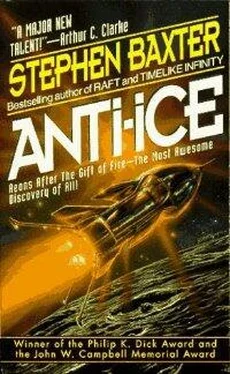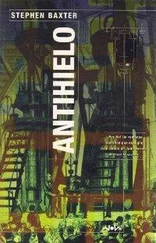I returned to the comfort of my parents’ home in Sussex; my family were quite inordinately glad to see me whole and healthy. I suffered a moving reunion with my brother Hedley; his scarred face crumpled with pleasure as I described Josiah Traveller, who had become something of a fascination for Hedley since their one-sided acquaintance in the Crimea. My London friends, several of whom came to visit, urged me to make a dramatic re-entrance into society, the more to capitalize on my heroic status. I looked on their faces, which seemed astonishingly young and fresh, and declined their various invitations—not from any uncharacteristic burst of modesty, for I should quite have enjoyed the admiring attention of the season’s belles as I described how it hadn’t been as bad as all that, really—but more from a lingering feeling of isolation. And besides, my confused feelings about Françoise were a turmoil inside me, incapable of resolution.
I went for long, solitary walks in the woods near my parents’ home, exploring these odd feelings. It was almost as if, having once shaken the dust of Earth from my boots, I felt unfit to return with whole heart to human society. And I found I missed the company of my erstwhile companions more and more.
I watched the colors of autumn spread through the trees, and wondered how such a sight would look from space.
I promised myself that I should immerse myself into the world of men as soon as my moment of fame had faded; and sure enough, fade it did—though not for reasons I would have welcomed. For as the nights of autumn drew in, so the plight of the French grew steadily more desperate.
The Prussians maintained their walls of men and guns around both Paris and Metz. In the Manchester press there were constant tales of famine stalking the streets of the French capital, and some rather more reliable accounts of how the armies of Marshal Bazaine, in Metz, were languishing in the mud, and were growing steadily more incapable even of defending themselves, let alone liberating Paris.
I perused the papers with endless, and morbid, fascination, as the leader writers discussed the choices and dangers facing Gladstone and his government. No civilized man, it was commonly agreed, would again wish to see anti-ice used as a weapon of war. But the Balance of Power was undoubtedly under its severest test, and there seemed a growing mood for some intervention before this precious and venerable guarantor of peace in Europe should be lost for ever.
Against this there were those who, remembering Bonaparte, had no desire to intercede in favor of the beleaguered French. And at the other extreme the Sons of Gascony and their like became ever more vocal in their demands that Britain should exert her evident power, not just to restore peace, but to impose order on the warring factions of Europe. The influence of these stern-minded gentlemen on the debate seemed to be growing; it was even rumored that the King himself sympathized with such views.
Reading this depressing stuff I was reminded of my conversations on the Phaeton with Bourne. No longer did I feel bound into such arguments, as I may have before my adventure; now I saw with a new aloofness how this national debate paralleled the internal ramblings of a deranged mind, which seeks to impose its inward fears and daemons on those around it.
At last, at the end of October, came the news that Bazaine’s forces in Metz—wet, starved and demoralized—had capitulated; this time the rampant Prussians took away 1,400 guns and more than 170,000 men. Although French forces fought on in various parts of the country, it was generally agreed in Manchester that the decisive moment of the war had come; that the Prussians, victorious in the field of combat, would soon be riding through the battered streets of Paris—and that if Britain were ever to intercede in this struggle for the future of Europe, now was the moment.
The clamor of newsprint, demanding action from Gladstone, grew until it seemed a silent shout all around me, and I felt I could bear the tension no longer.
I knew of only one way to resolve these feelings; and I packed a bag, bade a hasty goodbye to my parents, and made my way by Light and steam train to the home of Josiah Traveller.
* * *
I walked the last few miles to Traveller’s home. Not far from Farnham, the place was based around a small converted farmhouse, and it would not have attracted the eye—save for a brooding giant some thirty feet high which stood defiant at the rear of the house, its great aluminum shoulders covered by sewn-together tarpaulins. This was of course the Phaeton; and as that magical carriage loomed out of the dull landscape, I felt my heart lift.
I came around a hedgerow to Traveller’s house—and there, standing before his front door, was a rather splendid brougham of rich, polished wood. I realized immediately that I was not Sir Josiah’s only visitor of the day.
Pocket greeted my unheralded arrival with tremendous enthusiasm; he even begged my permission to pump my hand on his own behalf. The manservant was spry and secure now he was on firm ground, and he said, “I am sure that Sir Josiah will be delighted to see you, but at the moment he’s with a visitor. In the meantime, may I offer you tea; and perhaps you would care for a glance around the premises, sir?”
He did not volunteer the identity of this “visitor” and I did not press him.
As I sipped tea I said, “I’ll be honest with you, Pocket. I’m not entirely clear why I’ve come…”
He smiled with surprising wisdom, and said, “You don’t need to explain, sir. In these troubled times, I’m sure I can speak for Sir Josiah in stating that this house is a home to you. Just as the Phaeton was.”
I found myself coloring. “Do you know, Pocket, you’ve hit the nail exactly on the head… Thank you.”
Scarcely trusting myself to speak further I drew on my tea.
The house itself was surprisingly small and dingy. Its main feature was a large conservatory to the south-facing rear which had been converted by Traveller into an extensive laboratory. There was also a barn used for larger-scale construction. Several acres of land surrounded the buildings. Nothing grew in these rough fields, and in several places one could see dramatic scorched scars, where rocket engine tests, launches—and even explosions—had taken place.
The conservatory was quite a grand affair, with a framework of slender, white-painted wrought iron which gave the place a sense of lightness; various tools and machines lay in that gentle light like strange plants. The laboratory was laid out something like a milling shop; a steam lathe attached to the ceiling powered various metal-turning machines by means of leather bands, and fixed to benches around the floor were small lathes, a sheet-metal stamp, presses, acetylene welding sets and vices. The fruits of these tools lay all around, some familiar from my time on the Phaeton. Pocket pointed out a rocket nozzle, for example, which shone in the light of the weak autumn sun, its mouth upturned like the muzzle of some unlikely flower.
“And what of Phaeton herself?” I asked Pocket.
“We had the very devil of a time getting the old girl home from that farmer’s field in Kent. We had to take a steam crane out there to shift her, would you believe; and all the time that wretched man Lubbock protested at the ruts we were planting in his precious fields.”
I laughed. “You can’t blame the poor chap. After all, he didn’t ask to have us drop in on him in that extraordinary fashion.”
“And as for the old girl, Sir Josiah says she’s fared remarkably well, considering the ordeal through which we put her: an ordeal for which she was scarcely designed, of course.”
Читать дальше












